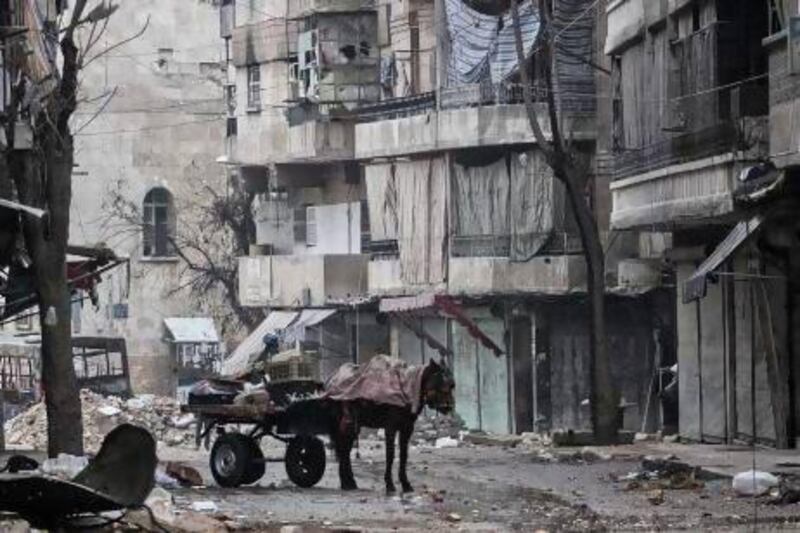DAMASCUS // Vladimir Putin yesterday backed calls for change in Syria, but warned a rebellion to overthrow Bashar Al Assad could lead to an endless civil war.
The Russian president said he had little interest in the future of his Syrian counterpart, and only wanted a settlement that would halt violence and prevent the break-up of the country.
"We are not preoccupied that much with the fate of the Assad regime. We realise what is going on there and that the family has been in power for 40 years. Undoubtedly, there is a call for changes," he said in his annual televised news conference.
"We are worried about another thing: what happens next," he said. "We don't want to see the opposition come to power and start fighting the government that becomes the opposition, so that it goes on forever."
He spoke as UN secretary general Ban Ki Moon said there was no prospect of solving the conflict without a strong Security Council decision, and UN human-rights investigators said the war was increasingly dirty.
"The parties have become ever more violent and unpredictable, which has led to their conduct increasingly being in breach of international law," said a report by the UN human-rights panel.
It accused the regime of using disproportionate force in attacks on non-military targets, including firing shells at hospitals, and said opposition groups were breaching basic human rights.
The UN investigators, led by Paulo Pinheiro, said Islamist fighters were entering Syria from across the world, mainly Sunnis from 29 countries siding with the rebels, but also Shiite fighters from the Lebanese militant group Hizbollah, aiding the regime.
There was evidence that members of minority sectarian groups - Syria is by majority Sunni Arab, with sizeable communities of Alawites, Christians, Druze and Kurds - were increasingly arming themselves as the fighting spread, the report said.
"As battles between government forces and anti-government armed groups approach the end of their second year, the conflict has become overtly sectarian in nature," it said,
The prospect of worsening sectarian violence is looming over a rebel offensive in the central province of Hama, where opposition forces claimed to have made gains against government troops on a key route connecting Damascus to Aleppo.
Parts of rural Hama are on volatile sectarian faultiness, with Alawite and Christian villages in the area rebels are seeking to control.
Success in Hama would further boost rebels, helping to cut off the capital from Aleppo, Syria's second largest city, and interrupt regime supply lines.
Aleppo has seen heavy street fighting since July, as both sides struggle to win full control over the city and the province that shares its name.
Fighting continued there, and in Damascus, yesterday. The southern suburbs of the capital have become another key battle ground. Torrential rain and bitterly cold winds did little to slow the fighting, although they did seem to have forced a pause in regime air strikes, the bad weather keeping fighter jets and helicopters out of the skies.
Rocket artillery barrages and mortars continued to be fired into disputed suburbs throughout the day.
The winter storm - flooding was widespread in poorly built Syrian homes - has only added to the misery of hundreds of thousands of displaced people, most recently those who have fled from Yarmouk, a densely populated district seized by rebels this week.
Some inhabitants of Yarmouk had cautiously started to return home yesterday, with mediation efforts underway for a rebel withdrawal to keep the neighbourhood a neutral zone.
"We are alive and cannot ask for more than that, but there has been no electricity and that is the only way we have of heating the house," said one Yarmouk resident who, with his family, escaped to a friend's house in a safer part of the capital. He was not ready to return home yet, he said.
Power cuts, long a problem across much of Syria, were extensive in the capital's suburbs. Rain frequently added to the problems of an overstrained electrical grid.
Regime security forces have continued their crackdown against secular, peaceful opposition members. On Sunday, seven political activists, including two nephews of vice president Farouq Al Sharaa, were detained in a Damascus cafe.
Zaidoun Zaubie, 38, a respected university professor and father of two whose wife is pregnant, together with his younger brother, Suhaib, 22, a medical student at Damascus university, remain in custody.
Both supported the uprising and wanted to see their Syria become a democracy, but had also worked to prevent radical Islamist groups from taking over.
They had refused to leave Syria or go into hiding, despite repeated warnings they were being targeted by security forces.
On Monday an interview with their uncle, Mr Al Sharaa, was published in the Lebanese newspaper Al Akhbar. He said Mr Al Assad would have to end his monopoly on political power and warned that neither the rebels nor the regime could win by military force without destroying the country.
psands@thenational.ae





